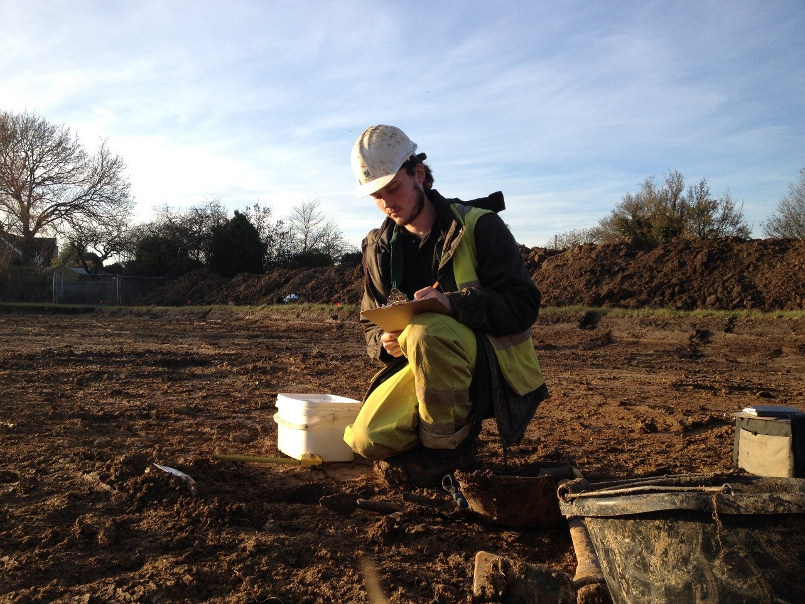
12 Feb From the Field: A Trainee’s Story
This is the first installment in our new series titled ‘From the Field’ where you will have the opportunity to meet some of the people who work for us. In each post we will hear from staff members as they share their career stories and provide an insight into their life as an archaeologist. We hope this series will show the different journeys people have taken to get where they are today. For our first career story we asked one of our former trainees, current site assistant, Chris, to answer some questions about what drew him to archaeology and the steps he took to begin his career.
What is your previous experience in archaeology?
I had always had a great interest in archaeology from a young age and I would probably have to say that Time Team was what truly captured my interest to begin with. When I started at Sixth Form College in Hereford I chose to study archaeology at A-level and I feel that this helped me with the groundwork in preparation to study the subject at Plymouth University. I took part in research excavations at The Knapp in Bredwardine in Herefordshire, where I learned some basic surveying skills. I stuck with archaeology and gained my undergraduate degree in the subject. My time at university included learning useful fieldwork skills, such as context recording and surveying, to help prepare us for a career in archaeology and heritage. I had little excavation experience before joining Headland, so I was very grateful when I was offered the trainee post.
What is your favourite archaeological site or object?
My favourite archaeological site would have to be Skara Brae in Orkney, Scotland. The settlement is so well preserved and offers an insight into the Neolithic way of life on Orkney. I have not had the chance to visit the site yet, but I definitely will in the future. My favourite local archaeological site is Arthur’s Stone Neolithic Chambered Tomb in the Golden Valley, Herefordshire. This is simply because of its personal significance to me as I used to spend a lot of time up on the hill it is located on. The site is still very much shrouded in some mystery as it has never been excavated and probably never will be due to its status as a protected monument. This for me, adds to the beauty of Arthur’s Stone.
How did you feel when you were offered the post?
I first contacted Headland by email asking if there was a possibility of any experience I could by volunteering. The reply I received was definitely not what I was expecting. I was given an interview at the Midland & West office with the opportunity of working for Headland as a trainee. This way I could gain experience and skills whilst on the job. I was thrilled to have been offered the job, because I had wanted become an archaeologist since I was young. I feel like my dream job has become a reality.
What have you learnt so far?
So far I have learnt how to properly excavate various archaeological features including cremation burials, midden pits, post-holes and more. I have learnt the basics of context recording, how to draw plans and sections, and how to take accurate photographs of features for the archaeological record. I have found that with archaeology you learn something new every day; as each day is different from the last.
What are your future plans/future ambitions?
I hope that I can keep working with Headland for some time as I have enjoyed working with the rest of the team here. I am planning to do a Masters in the not too distant future, either in archaeology or a related subject; beyond this I would like to further my career opportunities within the archaeological profession. I will look to either stay within archaeology or the wider heritage sector.
What advice would you give to other people wanting to apply for a training position?
Firstly, I would say to contact the company and ask about possible trainee positions. If you don’t ask you could miss an opportunity, and there is no harm in asking. You must also be willing to be adaptable to change as one day you could be in the office and the next out in the field on an excavation.



